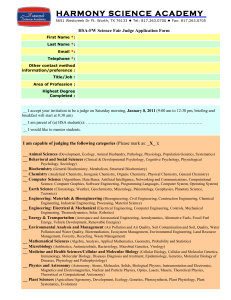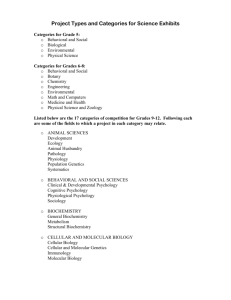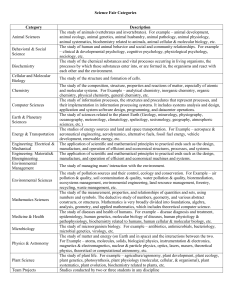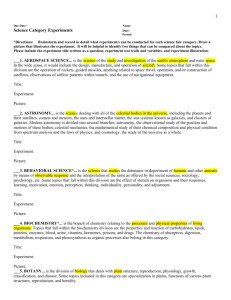NUS Pre-Med Program: Competency-Based Curriculum
advertisement
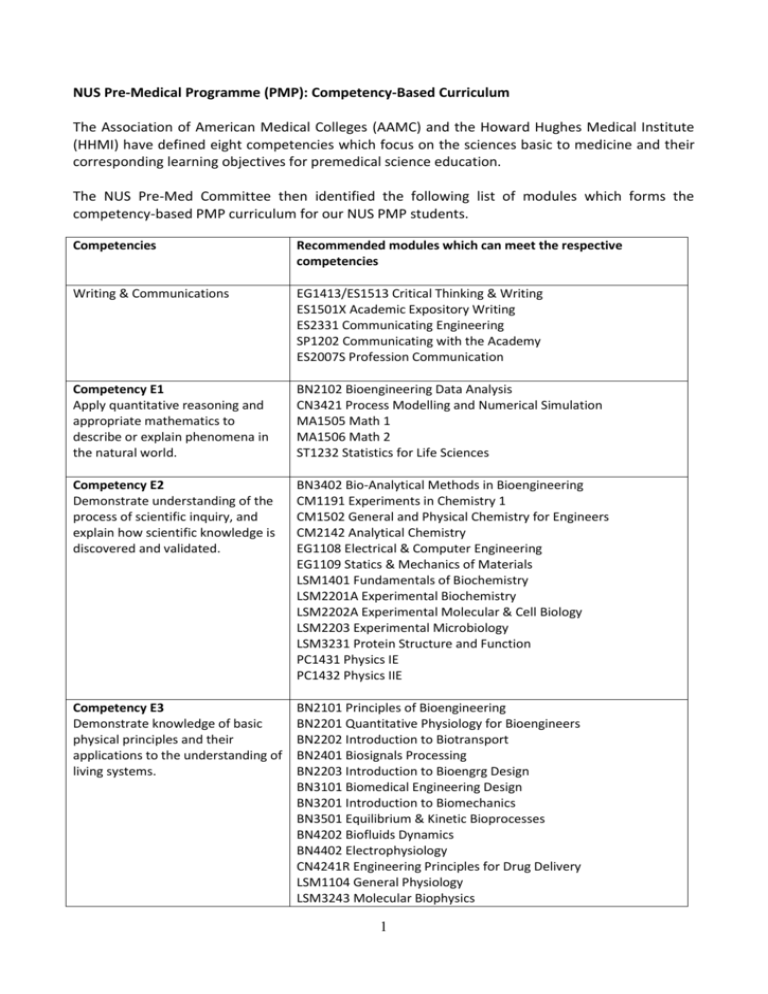
NUS Pre-Medical Programme (PMP): Competency-Based Curriculum The Association of American Medical Colleges (AAMC) and the Howard Hughes Medical Institute (HHMI) have defined eight competencies which focus on the sciences basic to medicine and their corresponding learning objectives for premedical science education. The NUS Pre-Med Committee then identified the following list of modules which forms the competency-based PMP curriculum for our NUS PMP students. Competencies Recommended modules which can meet the respective competencies Writing & Communications EG1413/ES1513 Critical Thinking & Writing ES1501X Academic Expository Writing ES2331 Communicating Engineering SP1202 Communicating with the Academy ES2007S Profession Communication Competency E1 Apply quantitative reasoning and appropriate mathematics to describe or explain phenomena in the natural world. BN2102 Bioengineering Data Analysis CN3421 Process Modelling and Numerical Simulation MA1505 Math 1 MA1506 Math 2 ST1232 Statistics for Life Sciences Competency E2 Demonstrate understanding of the process of scientific inquiry, and explain how scientific knowledge is discovered and validated. BN3402 Bio-Analytical Methods in Bioengineering CM1191 Experiments in Chemistry 1 CM1502 General and Physical Chemistry for Engineers CM2142 Analytical Chemistry EG1108 Electrical & Computer Engineering EG1109 Statics & Mechanics of Materials LSM1401 Fundamentals of Biochemistry LSM2201A Experimental Biochemistry LSM2202A Experimental Molecular & Cell Biology LSM2203 Experimental Microbiology LSM3231 Protein Structure and Function PC1431 Physics IE PC1432 Physics IIE Competency E3 Demonstrate knowledge of basic physical principles and their applications to the understanding of living systems. BN2101 Principles of Bioengineering BN2201 Quantitative Physiology for Bioengineers BN2202 Introduction to Biotransport BN2401 Biosignals Processing BN2203 Introduction to Bioengrg Design BN3101 Biomedical Engineering Design BN3201 Introduction to Biomechanics BN3501 Equilibrium & Kinetic Bioprocesses BN4202 Biofluids Dynamics BN4402 Electrophysiology CN4241R Engineering Principles for Drug Delivery LSM1104 General Physiology LSM3243 Molecular Biophysics 1 PC1421 Physics for Life Sciences Competency E4 Demonstrate knowledge of basic principles of chemistry and some of their applications to the understanding of living systems. CM1401 Chemistry for Life Sciences CM1501 Organic Chemistry for Engineers Competency E5 Demonstrate knowledge of how biomolecules contribute to the structure and function of cells. LSM1101 Biochemistry of Biomolecules LSM1401 Fundamentals of Biochemistry Competency E6 Apply understanding of principles of how molecular and cell assemblies, organs, and organisms develop structure and carry out function. BN4301 Principles of Tissue Engineering BN4403 Cellular Bioengineering LSM2103 Cell Biology Competency E7 Explain how organisms sense and control their internal environment and how they respond to external change. BN2201 Quantitative Physiology for Bioengineers BN2202 Introduction to Biotransport LSM1104 General Physiology LSM1202 Human Anatomy Competency E8 Demonstrate an understanding of how the organizing principle of evolution by natural selection explains the diversity of life on earth. LSM1102 Molecular Genetics LSM3252 Evolution and Comparative Genomics Reference 1. Report of the AAMC-HHMI Committee 2009 2

